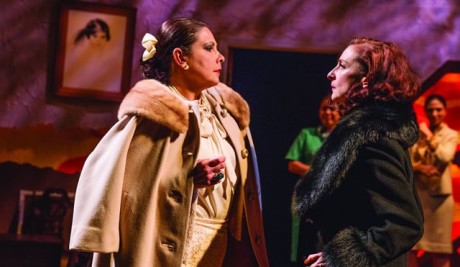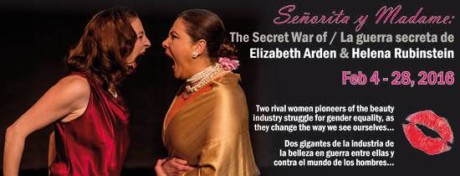The rivalry between Helena Rubinstein and Elizabeth Arden—two women who actually invented the cosmetics industry—is largely forgotten today.
Yet the story of these feminist icons, who at one time dominated headlines and made marketing history—along with millions of dollars—is the stuff of legends.
Luckily for theatre-goers in Washington, DC, their battles—which at times loomed larger than those of World War I—have been resurrected on stage by GALA Hispanic Theatre, where Señorita y Madame: The Secret War of Elizabeth Arden & Helena Rubinstein, had its US premiere this weekend.

Told in the form of alternating interviews for a television documentary, Señorita y Madame gets much of its humor from the verbal missiles that the women hurl at each other. Each woman erupts in volcanic rage whenever “the other” is mentioned—or even hinted at!
“Witch!,” “Bitch!” and “Whore!” are some of the epithets they shout. There are also accusations of sleeping with horses and face creams that smell like dung.
In between the curses, each woman tells her story.
As Helena Rubinstein, New York actress Ana Verónica Muñoz is utterly convincing as the older cosmetics queen. Ana Verónica is Venezuelan. Shrewd but self-deprecating, Munoz portrays the regal Madame as a peasant in regal garb. At times she is matronly and dignified. At other times she is terrified that people will see through the veneer and spot the poverty in which she purportedly grew up. (More on the “purportedly” later.)
Luz Nicolás is Elizabeth Arden, Rubinstein’s enemy and occasional alter-ego. Seen recently in Yerma, where she played the deliciously colorful role of town floozy, Nicolás is a star of television and film in her native Spain.
With flaming red hair, nails, lips and dress—all matching the blood that spurts from her veins whenever she deliberately pricks her finger—Nicolás is a walking ad for the company, which she blatantly names “The Red Door.”
Histrionic, perpetually young and sexy, she is the one who is accused of preferring horses to men.
She is also the one who prefers horses to Jews. Accused of anti-Semitism, she responds by saying, “I don’t hate all Jews, just that one.” Meaning Helena Rubinstein. But then, she adds, in a chilling throw-away line, “there are so many Jews like that.”
Venezuelan actor Carlos Castillo plays all the male roles, including Titus and Lewis, the cowering husbands of Helena and Elizabeth. He invests both of them with a kind of integrity that neither woman can see.
Cecilia de Feo, who is from Argentina, plays the probing reporter interviewing the two women, while Lorena Sabogal and Thais Menéndez fill in for all the other female roles, including Coco Chanel, Collette, Helena’s mother and sisters, Elizabeth’s business partner and various assistants and employees.
The cameraman is played with comic intensity by an actor called Manuex, who writhes every which way as he slithers upstage and down, following the characters around the stage and capturing their faces on video.
In a brilliant bit of staging—courtesy of Consuelo Trum, guest director from Venezuela—the video is projected simultaneously on a screen at the rear of the stage, so that we can see the magnified faces of the women, just as the television audience would see them.
The scenic and projection design is by Christopher Annas-Lee, whose lighting design for Yerma earlier this season has already been nominated for several awards. Mary Keegan is the lighting designer.
Because of the interview format—in which both women are looking back, separately, at a conflict that outlasted two world wars—the first act sometimes feels static. However, things pick up in the second act as world events take over.
Claudia Aponte adds a strong sense of drama as sound designer and composer, while Lynda Bruce-Lewis and Reuben Rosenthal do an excellent job in their combined roles as stage manager and technical director.
The costumes, by Robert Groghan, evoke the wealth and status of the women, as they parade in their fur-trimmed coats and their signature red and white outfits. The dual husband, clad in suspenders, is clearly the hired-hand.
Venezuelan playwright Gustavo Ott—whose work is performed around the world and has been translated into 15 languages–has taken some risky steps in an otherwise carefully crafted drama. The decision to tell the story as an interview, with relatively little interaction, puts a burden on the actors, who must be stand-up comedians, mugging their way through a series of funny dramatic monologues.
There are also some odd discrepancies in the historical material. In the play, Rubinstein is ashamed of her childhood in Krakow. She describes herself as a “peasant,” mired in poverty and stuck on a farm full of chickens and cows. In fact, Rubinstein’s father was a shopkeeper, who insisted that she attend medical school at the local university. She dropped out and ran off when her father refused to allow her to marry a fellow student.
https://youtu.be/4WRfmyvAELg
The playwright has done a service to women in general by highlighting the achievements of these two very successful women. Both, he points out in the program, were great entrepreneurs, way ahead of their time. Both were advertising geniuses, and both fought for women’s rights at a time when women were not even allowed to vote.
Like all GALA productions, Señorita y Madame is performed in Spanish, with the English words displayed on screens mounted over the stage. Since I don’t understand Spanish, I was grateful for the translation, written by Heather McKay. It was also—unlike many of the subtitles on television—completely in tune with the dialogue. However, my companion, a retired Latin American diplomat, found the spoken Spanish infinitely better than the English. He said The Spanish—as written by Gustavo Ott and spoken by the extraordinary cast–was far more poetic and passionate.
I strongly urge local theatregoers to come and see Senorita y Madame for the passionate performances of Ana Verónica Muñoz and Luz Nicolás who burn up the GALA stage.
Running Time: Two hours, including one 15-minute intermission.
Senorita y Madame plays through February 28, 2016 at GALA Hispanic Theatre – 3333 14th Street, NW, in Washington, DC. For tickets, call (202) 234-7174, or purchase them online. Here are directions.
Senorita y Madame is performed in Spanish with English on-screen translations.
RATING:





